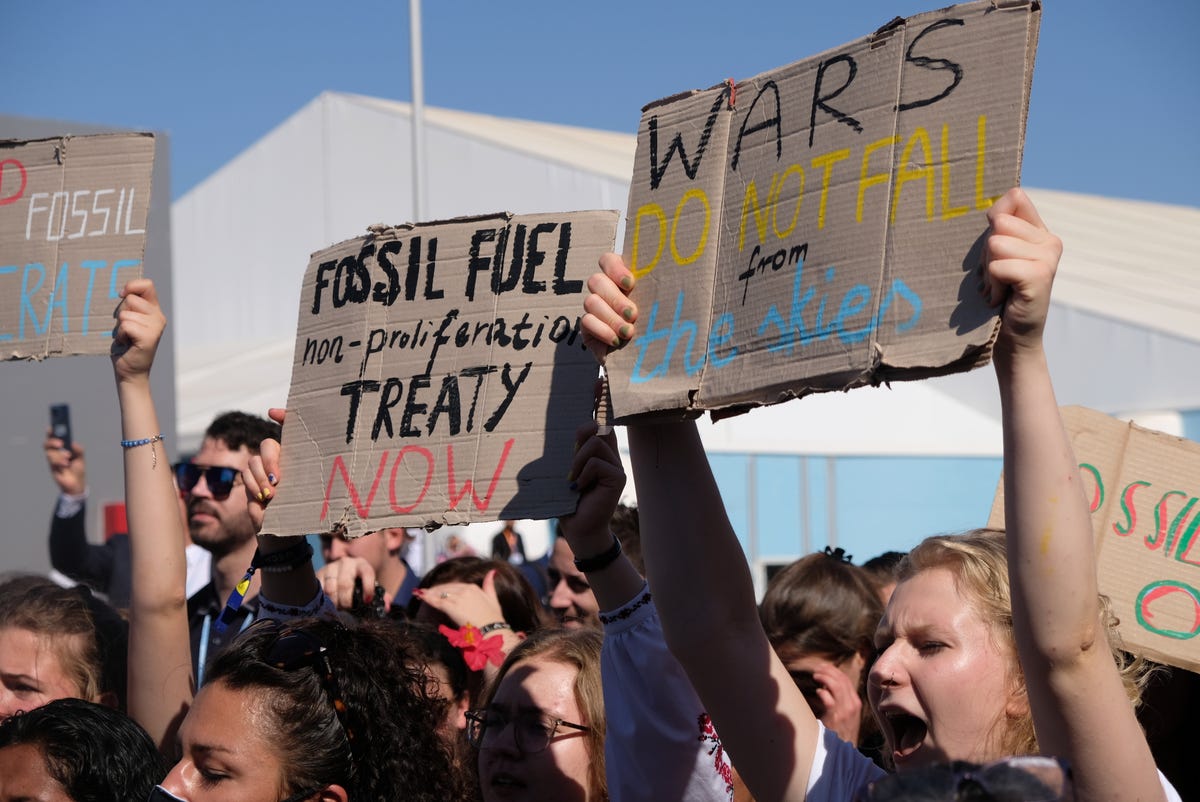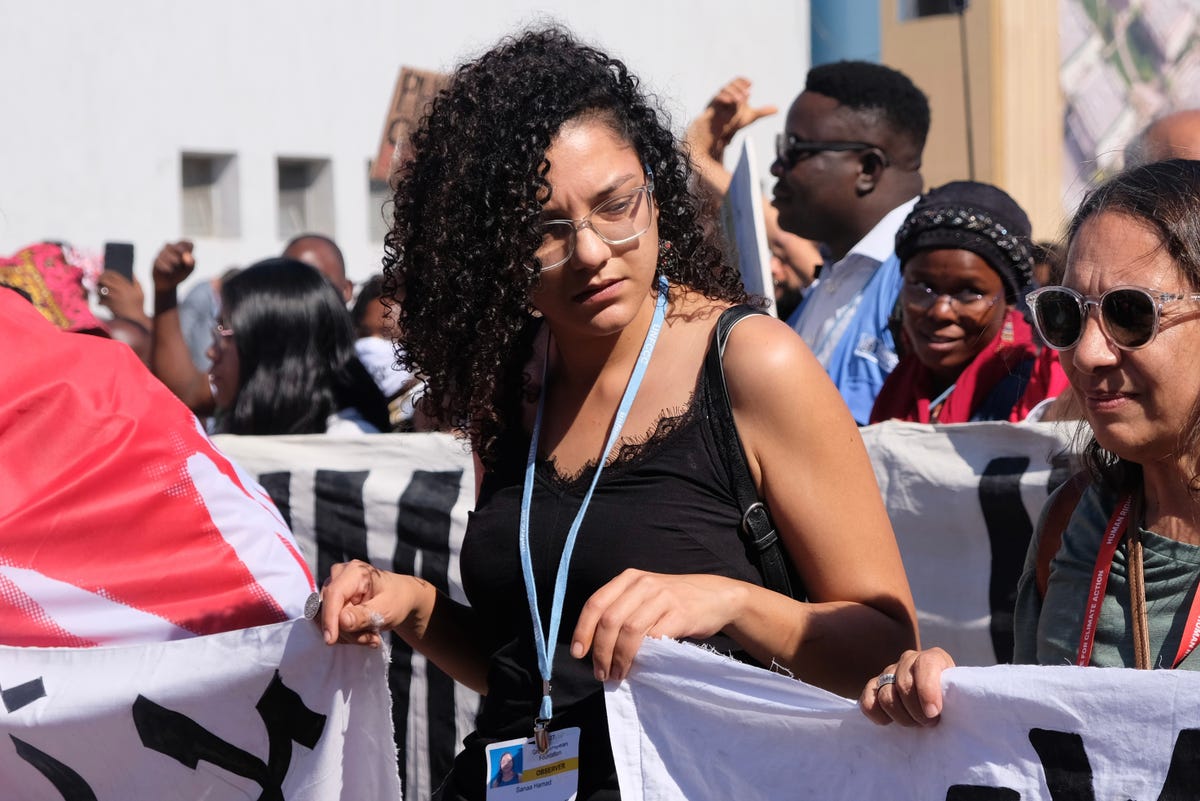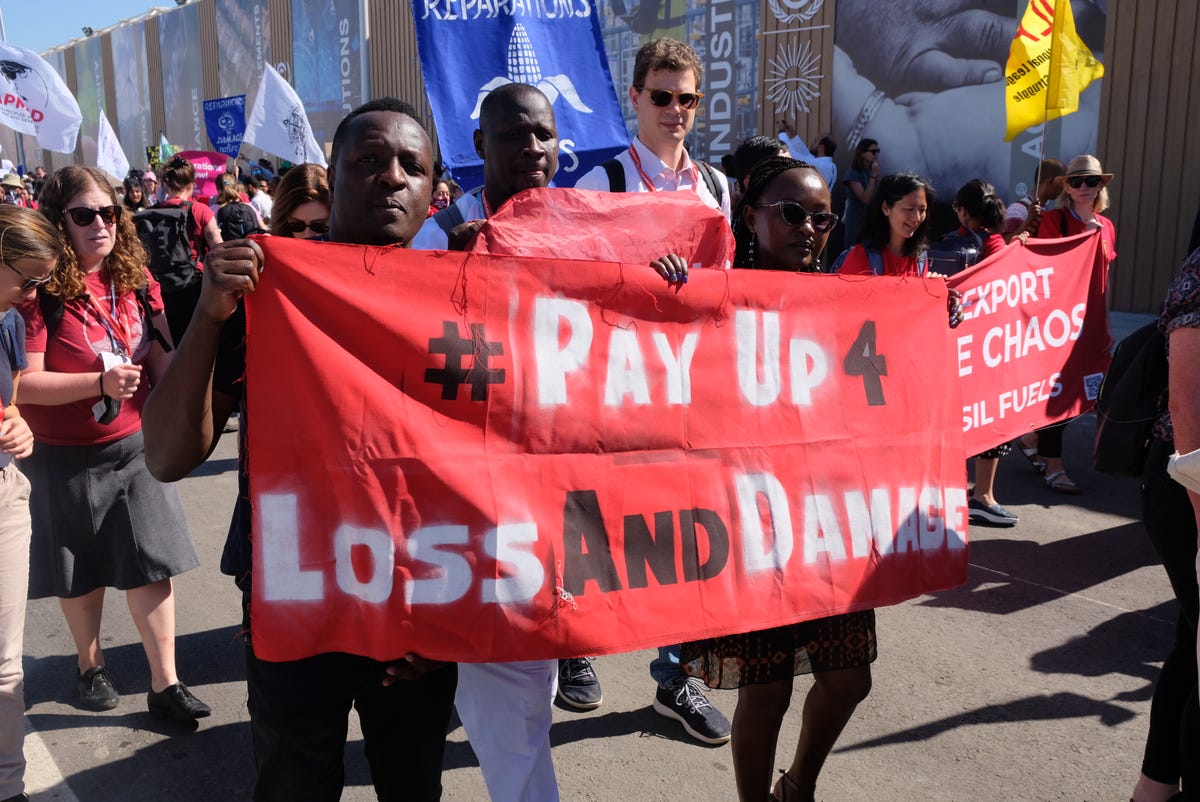
This story is part of Choosing Earth, a series that chronicles the impact of climate change and explores what's being done about the problem.
The Egyptian resort town Sharm el-Sheikh, which plays host to the UN's COP27 summit on the environment, is now the epicenter of the fight for climate justice. But on Saturday, the midpoint of the two-week conference, protests erupted in cities around the world, from London to Washington, as activists joined the cry for more to be done.
The Global Day of Action is supposed to be a sprawling protest to advocate for everything from loss and damage financing to kicking fossil fuel reps out of climate talks. But at COP27, activists instead found themselves hemmed inside the grounds of the conference center. The short march of several hundred people made a tight circle around the venue, before gathering in one of the limited larger outdoor spaces to hear from activists representing different continents and causes following an Indigenous blessing.
The scene provided a stark contrast to last year's Global Day of Action at COP26, when activists were joined by people from across the UK to take part in an epic march that totaled around 100,000 people across the entire city of Glasgow, before gathering in a city park for a rally that stretched as far as the eye could see.
The wide disparity underscores the tenuous fine line that protesters need to walk at COP27, given the host country's mixed attitude toward freedom of speech. Activists are an important presence at the summit, providing grassroots perspectives on the impacts of climate change. Collectively, they stand together as the climate justice movement – protesting not only for an end to fossil fuels, but for a fairer, more equitable world. This includes calling out human rights abuses committed by polluting companies and governments while they pursue energy projects. But the activists' limited ability to protest at the summit has cast a harsh spotlight on this critical tie between fighting for human rights and fighting to save the planet.
As a result, crowds like those that appeared last year weren't possible here at COP27 due to security restrictions preventing protests on the streets of Sharm el-Sheikh, said Asad Rehman, director of the anti-poverty charity War on Want. "We came here knowing that we were not going to be in our thousands, but those that are here are united and raising our voices together," he said.
The lack of representation comes at a time when more voices are trying to make themselves heard as climate change's broad impact begins to materialize in different ways for different regions.
"We're seeing here that civil society space has shrunk, and it's a deliberate way to suppress the voices of the people in the most marginalized groups," said Mitzi Jonelle Tan, a Fridays For Future MAPA activist from the Philippines. (MAPA stands for "most affected people and areas.") "How can we claim to have a successful climate conference without the voices of the people who are most impacted by the climate crisis?"

Mitzi Tan Jonelle helped lead the Global Day of Action protest at COP27.
Katie Collins/CNETThere has been widespread debate among observers and participants about whether the focus on human rights at COP27 is distracting from the main task of the summit, which is to implement climate action. But speaking at an event at the summit, Tirana Hassan, acting executive director at Human Rights Watch, reminded the audience that human rights are enshrined in the climate-focused Paris Agreement for a reason: to ensure solutions put forward don't violate the rights of vulnerable people.
"The climate crisis itself is one that compounds existing inequalities," she said. "When governments restrict particular human rights and freedoms of expression, assembly and association, that makes it very difficult for climate activists to be able to do their jobs."
People working across the spectrum of environmental policy credit the tireless work of activists for shifting the needle on many core issues that are now integral to the climate agenda. At COP and at other climate talks, they are viewed as an essential and valuable asset, calling out greenwashing, demanding transparency, campaigning for justice for those who are most impacted by climate change and elevating the voices of those on the front lines of the crisis.
It is in large part thanks to the work of activists, some of whom have been working for more than 30 years on the issue, that the subject of "loss and damage" has finally made it onto the agenda this year. Loss and damage lies at the intersection of human rights and climate action. It's a term used to describe compensating people who are already experiencing the worst impacts of climate change despite living in the countries that have contributed the least to the crisis.
"Our demands are clear," said Tan. "We need a loss and damage finance facility for climate reparations. That's all we're asking for basically – a world where we feel safe, a world where no one has to be afraid. Why are we being punished for that?"
COP27: A safe space to speak
The smaller, more claustrophobic march that took place on Saturday has been emblematic of activist activity at COP27. All protests at the summit have been distinctly muted in comparison to those that took place at COP26. There's a chance that even if you're attending COP27, you might not have seen any at all.
Activists at the summit told CNET that they're too fearful to protest anywhere outside of the "Blue Zone" – the secure venue in which the official summit takes place – due to potential reprisals. Many Egyptian environmental activists are languishing in prison, and activists who have come to the summit to represent the climate justice movement are wary of surveillance. "What we can speak here, we can't speak outside of these walls of this conference," said Rehman.
Wiktoria Jędroszkowiak, a Fridays For Future activist from Poland who traveled with a group of young Eastern European activists, including some from Ukraine, said they were filmed on their flight from Istanbul to Sharm-el-Sheikh and at the airport by someone waving a Russian ID in their faces. Some of the group have already been searched by security. Other activists I spoke to were wary of being targeted for their LGBTQ+ identities, which aren't well tolerated in Egypt.

Activists felt safe protesting inside the COP27 venue.
Katie Collins/CNETThe Egyptian COP leadership has set aside a fenced-off area of land on the edge of the desert that activists can apply to hold protests in, although it did not respond for a request for comment when asked about the exact address, whether it would be possible to visit or how many people had made use of the space so far.
Activists I spoke to are wary of being penned in by Egyptian police – better sticking to the neutral ground of the Blue Zone, where the only security to contend with is provided by the UN. "It's a bit safer for me because of the security and everybody around, so there's no cause for alarm," said Goodness Dickson, who protested in the Blue Zone for loss and damage on Thursday.
On Thursdays, we wear white
There is no strict dress code at a UN climate summit. From tailored suits to Indigenous dress to T-shirts and sandals, anything goes – especially when the summit is held on the edge of the Egyptian desert.
But on Thursday, a significant proportion of the attendees at the climate talks turned up to the venue wearing white – an intentional, coordinated decision that represented a show of solidarity with Egypt's political prisoners – of which there are thousands.
The first couple days of COP27 saw nothing in the way of protests. But the arrival of Sanaa Seif, sister of Egypt's most famous political prisoner, Alaa Abdel-Fattah, on Tuesday set something in motion.
Abdel-Fattah, sentenced to five years in prison for sharing a Facebook post, has been on a long-term hunger strike, and ceased drinking water since the beginning of COP27. He is still alive due to medical intervention, but would otherwise now be dead – a PR disaster for COP that Egypt can ill afford.
An Egyptian lawmaker accosted Seif during a press conference and had to be removed by UN security. Later that day, at an event hosted at the German Pavilion with Amnesty International and Human Rights Watch, Seif said she was glad there was space to talk about her brother and human rights at COP.
"I'm really heartened by the solidarity, and that's what's keeping me together," she said. "Regardless of the repercussions afterwards, I think what happened here was ultimately a good thing."

Sanaa Serif spoke out for her brother at COP27.
Katie Collins/CNETSeemingly buoyed by Seif's bravery in addressing the elephant in the room, activists have increasingly protested inside the Blue Zone for Abdel-Fattah – often throwing off layers at the end of events to reveal "Free Alaa" T-shirts. This year, along with the cries of "What do we want? Climate justice! When do we want it? Now!" is a different call: "Free Alaa! Free them all!"
Addressing the press conference incident with reporters, Egyptian Ambassador Wael Aboulmagd said it's "definitely the theme around the COP that people can speak their mind and make any statements they wish to make."
That may be the case during COP27, but Egyptians who have taken the opportunity to speak up know that goodwill may not last. Under President Abdel-Fattah El-Sisi, the ability to speak out has become increasingly restricted, said Hossam Bahgat, the founder of the Egyptian Initiative for Personal Rights, speaking at the German Pavilion event. He detailed how people have been targeted for expressing opinions on social media, how many websites are blocked in the country and how media outlets have increasingly been silenced. "Egypt was never a liberal democracy," he said. "But we had a fighting chance, we had room for resistance."
In the past few years, it's become too difficult for human rights activists to try to help communities suffering the consequences of environmental damage caused by power plants or military projects, he added. Any visits by human rights defenders to these communities will be swiftly followed by visits from the police who will arrest local citizens as payback.
During the event, people wearing host country badges filmed Bahgat as he spoke, took photos of the protesters wearing "Free Alaa" T-shirts and attempted to mount a counterprotest. He knows he's putting himself at risk – that after the global media and dignitaries have departed, he may suffer the consequences of speaking out.
"It is something that is currently on every Egyptian activist's mind," he said. But when it was announced that COP27 would come to Egypt, it seemed like too good an opportunity to pass up to speak out with the whole world listening, he added.
Bahgat is subject to a travel ban that prevents him from leaving Egypt, meaning he rarely has an opportunity to speak on the international stage, or even a local one (his organization is not allowed to hold press conferences in Cairo). "The mountain came to Mohammed," he said.
There are many, including Secretary General of Amnesty International Agnès Callamard, who feel that COP should not be held in countries such as Egypt and the United Arab Emirates (the location of COP28) where people do not enjoy the freedom to protest and where there are track records of human rights violations.
"In an environment where there is no transparency, no predictability, where there is no access to information, no freedom of the press, what kind of effective climate policy can you have?" she said, also speaking at the German Pavilion event. "There is no critique, there is no dissent."
But while COP27 is in Egypt, she too is determined to use the opportunity to campaign for change. "We are making what we can out of it here, we will do the same in the UAE," she said. "So that's a message to them: release your political prisoners now. You have one year."
Solidarity at the "African COP"
Ultimately, Bahgat is grateful that COP27 came to Egypt. "We needed the attention, we needed the solidarity," he said. "I don't think that UN summits should only go to the democratic countries, UN summits should go to anywhere where civil society and activists need to be heard."
And they are being heard. World leaders visiting COP over the past year have taken up Abdel-Fattah's cause, both calling publicly for his release and speaking directly about the issue with El-Sisi – but to no avail. He's also been widely supported by climate justice activists across the world, both before and during COP, even though they also know they're still putting themselves at risk.

"Tax the rich": Activists want reparations from wealthy countries.
Katie Collins/CNETThose who have protested reported being told by UN security inside the Blue Zone to remove "Free Alaa" T-shirts before exiting the venue and to leave banners behind in case they were spotted or searched by Egyptian police.
Finding the guts to stand up and speak out in spite of the risks is something Shamim Wasii Nyanda from Tanzania knows all too well. She has been reprimanded several times in her own country for protesting environmental justice issues, but still she feels a responsibility to do it.
"There are so many activists out there who cannot stand out and speak, because they're very much scared," she said. "And because I have the platform and the opportunity, and the people who can help me echo that voice, then I take advantage of that opportunity."
It's been especially difficult for African activists to represent themselves at COP27 due to a mix of human rights and logistical barriers preventing their attendance, which Rehman described a "huge disappointment." "This should have been an Egyptian COP, it should have been an African COP," he said.

High prices have prevented many African activists from attending COP27.
Katie Collins/CNETStanding on a ledge at the rally on Saturday and addressing the crowd, Nigerian activist Nnimmo Bassey echoed these sentiments. "This is not an African COP because the COP is lost and damaged," he said, referring to the widespread belief among activists that the UN process for tackling the climate crisis is a broken system. Africa has been historically robbed and polluted and is still being assaulted by oil, gas and mining companies, he said, as people hollered and cheered in support.
Next to him, Seif, who had been front and center in the march through the Blue Zone, stood visibly trembling. Rehman read out a statement on her behalf, in which she thanked the climate justice movement for lifting up her voice and saying that after COP she would return to Cairo to join her mother, who waits daily at the gates of the prison hoping for news of Abdel-Fattah.
"Your actions have turned the slogan, 'There is no climate justice without human rights' into a reality," said Rehman, reading her words. "One day, I hope my brother will be able to stand here with you and raise his voice as he has always done for the repressed, the criminalized, the marginalized and the ignored."









 Add Category
Add Category